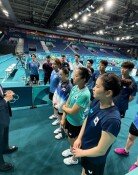President Yoon calls for 'Freely Unified Korea'
President Yoon calls for 'Freely Unified Korea'
Posted March. 02, 2024 07:46,
Updated March. 02, 2024 07:46
In his address marking the March 1st Independence Movement Day, President Yoon Suk Yeol declared, "The March 1st Movement reaches its true completion only when every individual relishes in freedom and prosperity through reunification," underscoring the necessity of progressing toward a Korean Peninsula unified in freedom. He criticized the North Korean regime's oppressive rule and human rights abuses as an affront to universal human values, advocating, "The expansion of freedom and human rights is the pathway to reunification." Additionally, the presidential office disclosed intentions to update the decades-old 'National Community Unification Formula' to infuse it with liberal values for a fresh reunification vision.
President Yoon's March 1st oration can be seen as broadening the persistent theme of liberty in his addresses into a 'liberal reunification theory.' Highlighting 'freedom' 17 times and 'unification' eight times, he contended that establishing a 'freely unified Republic of Korea' aligns with the global movement toward liberalism and the origins of the March 1st Movement, framing it as "a historical and constitutional duty of a president." This stance signals his leadership ambition in the reunification discourse.
Yoon's reunification narrative sharply contrasts with North Korea's rejection of the concept, evidenced by Kim Jong Un labeling fellow Koreans as the 'foremost enemy' and his calls to eradicate the notions of 'unification, reconciliation, and compatriotism.' In this context, Yoon lambasted North Korea for its dictatorial suppression, positioning his reunification philosophy rooted in freedom and human rights as a counter-offensive.
The government's assertive reunification approach is deemed necessary and apt, particularly when voices within our nation suggest redefining North-South relations as 'inter-state relations' to counter North Korea's antagonistic stance. Reunification remains a critical principle and mission, reminiscent of East Germany's rejection of a singular national identity, leading to its collapse, a fate North Korea could similarly face.
Yet, the government's perspective on reunification shouldn't be static. Previous perspectives, such as 'reunification will come unexpectedly' or 'reunification is a jackpot,' often resurfaced during strained North-South relations, inadvertently escalating conflicts and stoking ideological divides domestically. The current moment calls for robust security measures paired with a nuanced strategy to reduce tensions. The reunification debate should transcend ideological confrontations with North Korea, aiming for a narrative that garners nationwide consensus.







